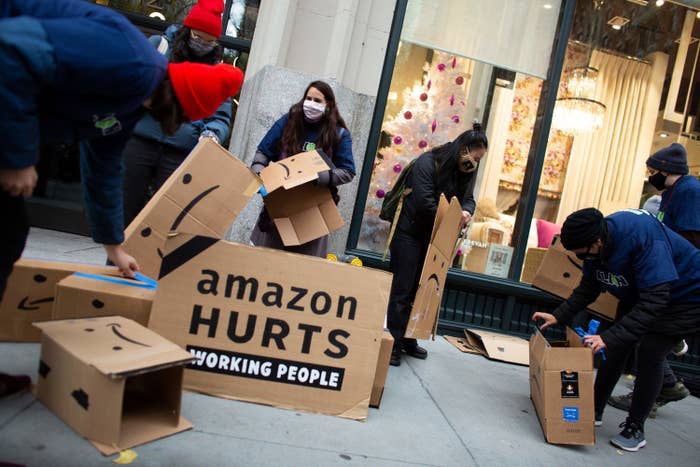
This spring, six different Amazon employees claimed they were wrongfully terminated by the company in retaliation for their involvement in organizing to improve working conditions. Now, at least one of those workers, Courtney Bowden of Pennsylvania, will have her case heard before a judge. Although a victory would mean little in terms of punitive damages, it would represent a big win for workers attempting to bring union representation to the nation’s second-largest private employer.
Last month, the National Labor Relations Board issued a complaint in Bowden’s case, meaning the agency found merit in her allegations that Amazon threatened, suspended, and ultimately terminated her because she had been talking with coworkers at an Amazon warehouse in King of Prussia, Pennsylvania, about pay and other workplace issues, which is a legally protected activity.
In the complaint, which was issued on Nov. 13 and obtained by BuzzFeed News via a Freedom of Information Act request, NLRB acting Regional Director for Philadelphia Richard P. Heller wrote that, based on the allegations, Amazon “has been interfering with, restraining, and coercing employees in the exercise of the rights guaranteed” by the National Labor Relations Act. Bowden’s hearing before an administrative law judge is currently scheduled for March 9, 2021.
Bowden was among the Amazon workers who were fired this spring during the unprecedented period of worker unrest that followed the coronavirus pandemic, but her activism within Amazon started before that. According to the complaint, Bowden began advocating for warehouse workers to receive paid time off in December 2019.
She wasn’t alone in that effort: A group of Amazon workers in Sacramento also thought it was unfair that Amazon provided some warehouse workers with paid time off but not others, and started circulating a petition on the issue in December. By March, they had finally succeeded in getting Amazon to give them PTO, BuzzFeed News reported at the time.
But by then, Bowden said Amazon had already begun its retaliation for her involvement in the campaign. According to the complaint, the targeted discipline started in February, when she was told she had violated a rule about how employees should wear their hair at work, a regulation she alleges was enforced “selectively and disparately” against her because she spoke out about time off and fair pay.
Amazon ultimately suspended Bowden, saying she engaged in an altercation with a supervisor, and, in March, fired her.
In an interview in May, Amazon Executive Vice President Dave Clark told Recode that in more than two decades at Amazon, he had “never seen anybody punished or terminated or anything for speaking out or having a contrary opinion or debating something. And that continues to be the case.”
But the NLRB’s decision to take up Bowden’s case casts doubt on that assertion.
Amazon filed its mandatory response to the NLRB complaint late last week, per the NLRB’s online docket, but a company spokesperson declined to provide BuzzFeed News with a copy and did not respond to a detailed list of questions about its labor practices.
In its complaint, the NLRB said Amazon should prepare to turn over documentation to provide Bowden with back pay “as may be just and proper to remedy the unfair labor practices alleged.”
While Bowden is hopeful about the outcome of the trial, she feels that winning PTO for her former coworkers by speaking out is already a major accomplishment.
Her goal, she told BuzzFeed News, is for “coworkers to see that speaking up about bad working conditions and work benefits is not wrong, and to not be fearful for speaking up for what's right, because they have a right by law.”
By October of this year, nearly 20,000 Amazon employees had contracted the coronavirus. As concern about the spread of the virus grew in the first half of the year, Amazon employees in a number of locations including Chicago, Minneapolis, New York, and Detroit organized protests and petitioned the company to improve safety measures and raise pay. Some of the employees who participated in those actions were later fired, including Chris Smalls in New York, Bashir Mohamed in Minneapolis, and Maren Costa and Emily Cunningham, two Seattle-based corporate employees who led a group called Amazon Employees for Climate Justice and attempted to organize an event in support of warehouse worker safety.
While Amazon will have to defend its treatment of Bowden before the labor board in Pennsylvania, its lawyers have successfully gotten charges in other venues dismissed. In San Leandro, California, the NLRB said in August that Amazon isn’t violating workers’ rights by prohibiting them from posting flyers to an internal bulletin board. In Woodside, New York, the board decided last month not to pursue a worker’s charge of retaliation by Amazon because the worker, who filed the charge in May, is no longer on probation and has since been converted to full-time status. There are currently several open, unresolved NLRB cases against Amazon, including charges of unfair labor practices in Ohio, Florida, and Seattle.
Meanwhile, last month a federal judge dismissed a lawsuit brought by four Amazon employees in Staten Island in June who said the company had failed to protect them and their coworkers from the coronavirus threat. In his decision, the judge said it was a matter for Occupational Safety and Health Administration (OSHA), which has been notably lenient in its enforcement of COVID-19 health and safety protocols.
Even if Bowden wins her case before the NLRB, the penalties for Amazon will be very small — they might be asked to repay her lost wages, give her job back, or hang a flyer in the workplace.
“It’s more symbolic than substantive,” said Rebecca Givan, a professor of labor studies at Rutgers University. “Companies lose NLRB rulings all the time and the remedies are so minuscule that they don’t feel any need to change what they’re doing.
“But I think the symbolic part could be larger, because Amazon workers there and elsewhere will realize that the employer is willing to break the law and that they have legal rights — and if they start to assert them in a more deeply organized manner, they might start to make progress.”
Some unions are already taking on that organizing work. In Washington state, the UFCW, which represents grocery workers, is conducting a long-term campaign to organize employees at Whole Foods, which is owned by Amazon, while workers at an Amazon warehouse in Alabama recently announced their intention to hold a union election to determine whether they will join the RWDSU.
The NLRB has already shot down Amazon’s first attempt to delay that election, the Washington Post reported Wednesday. But Amazon has made it clear that it intends to fight any unionization effort with every means possible; the company has hired expensive security firms to monitor workers it thinks might be engaged in organizing coworkers, Vice recently reported. Meanwhile, under the Trump administration, the NLRB, the agency that’s meant to protect workers from things like illegal surveillance, has grown only more underfunded, understaffed, and tipped in favor of employers.
Under a Biden presidency, Givan said, there’s a real possibility for federal legislation that would shore up labor protections. But Amazon, which employs more than 1.2 million people around the world and brought in $96.1 billion in revenue in the third quarter of 2020 alone, is a massive and fast-moving target.
“It will take a huge, smart, strategic campaign to do more formal traditional unionizing at Amazon,” Givan warned.
As for Bowden, “if [she] wins, and she’s willing to talk to other workers, and if she decides to go back and keep working there and talking about organizing and winning improvements, then there may be the seeds of a campaign,” Givan said.
“But it’s a long, long road ahead.”
UPDATE
In a copy of Amazon’s answer to the NLRB complaint, which BuzzFeed News obtained via Freedom of Information Act request, Amazon denies that it violated Bowden’s rights by firing her. In the filing, Amazon says it terminated Bowden due to “serious and egregious violations of Company polices [sic]“, including Bowden’s alleged “threat to “beat [the] ass” of co-worker and insubordinate refusal to follow repeated directions from management.”

